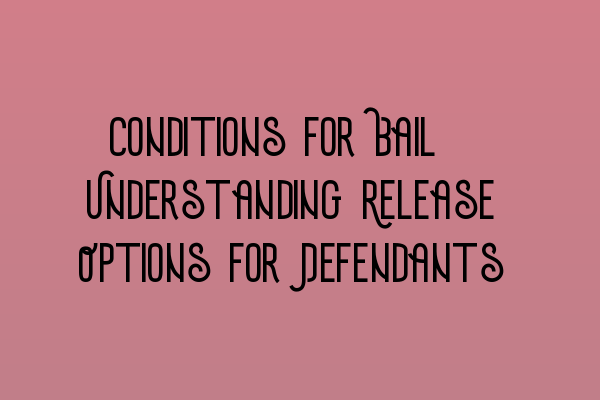Conditions for Bail: Understanding Release Options for Defendants
When it comes to criminal cases, one of the most crucial decisions is whether a defendant should be granted bail. Bail allows a defendant to be released from custody while awaiting trial, but it comes with certain conditions to ensure the safety of the community and the defendant’s appearance in court. In this article, we will explore the conditions for bail and the various release options available for defendants.
Conditions for Bail
When granting bail, the court may impose certain conditions on the defendant to minimize the risk of further criminal activity or failure to appear in court. These conditions may include:
- Surety: The defendant may be required to provide a surety, which is a sum of money or property pledged to the court as security for the defendant’s appearance.
- Reporting: The defendant may be required to regularly report to a specified police station or court, to ensure that they are adhering to the conditions of their bail.
- Residence: The defendant may be required to reside at a specific address and not leave without permission from the court.
- Curfew: The defendant may be required to stay at home during specified hours, typically during the night, to ensure they do not engage in criminal activity.
- Non-association: The defendant may be prohibited from associating with certain individuals, especially if they are co-accused or potential witnesses.
These are just a few examples of the conditions that can be imposed on a defendant. The specific conditions will vary depending on the circumstances of the case, the defendant’s criminal history, and the court’s assessment of the risks involved.
Release Options
Now that we’ve explored the conditions for bail, let’s take a look at the different release options available for defendants:
- Police Bail: After being arrested, the police may release the defendant on bail while they continue their investigations. The police may impose their own bail conditions, or the defendant may be required to attend a police station regularly.
- Court Bail: If the police decide not to grant bail or if the defendant is charged with a more serious offense, the case will be brought before a court. The court may then decide whether to grant bail and impose conditions accordingly.
- Surety Bail: As mentioned earlier, the court may require the defendant to provide a surety, either in the form of money or property, to secure their release on bail. The surety acts as a guarantee that the defendant will comply with the conditions imposed by the court.
- Electronic Monitoring: In some cases, the court may require the defendant to wear an electronic tag or be subject to electronic monitoring. This ensures that the defendant remains within certain geographical boundaries and adheres to any curfew conditions.
- Residential Requirements: In certain circumstances, the court may require the defendant to reside at a specific address, such as a rehabilitation facility or a relative’s home, as a condition of their bail.
It’s important to note that the court will consider several factors when deciding on the appropriate release option, including the nature and severity of the offense, the defendant’s criminal history, their ties to the community, and any potential risks they may pose if released.
